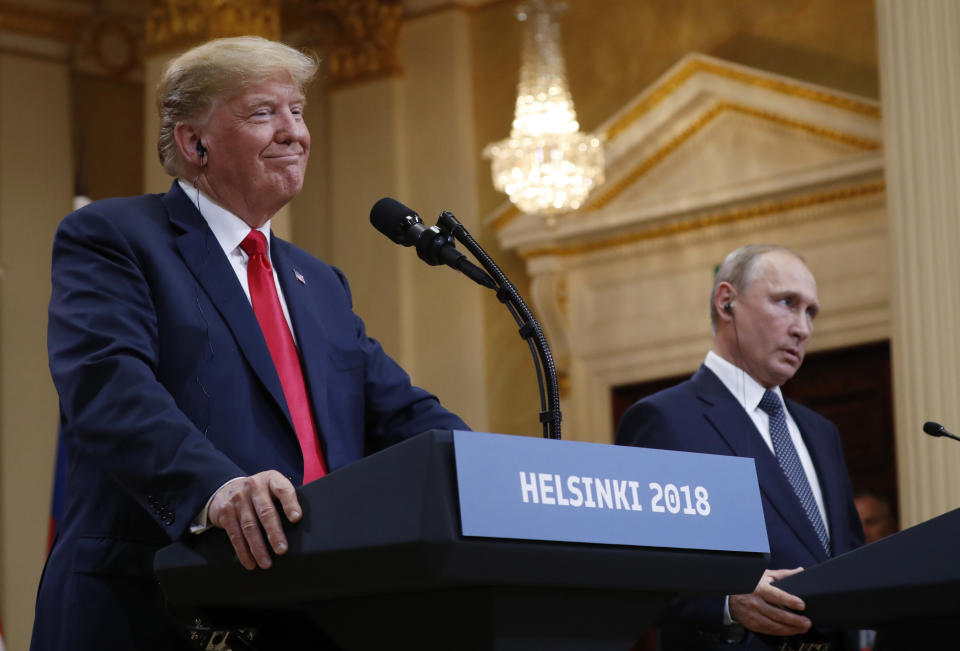Ex-Intelligence Official Reveals The Challenges Of Briefing Trump
President Donald Trump would often question the veracity of his intelligence briefings, telling officials, “I don’t think that’s true,” or, “I’m not sure I believe that,” according to the former No. 2 intelligence official.
Susan Gordon, who until recently served as the principal deputy director of national intelligence, detailed her experiences briefing Trump at an event Tuesday by the Women’s Foreign Policy Group in Washington, according to CNN. (See the video above.)
But beyond his doubting of intelligence information, she said, the bigger concern was that Trump often received his own information from questionable sources.
“Remember, intelligence is fundamentally a craft of uncertainty and of possibility, so that doesn’t put you off,” Gordon said. The difficulty was in “trying to catch up to how you adjudicate the sources that led him to believe that, and how you respond to it.”
Trump routinely parrots false information from right-wing conspiracy theories (often promulgated on his favorite cable news network, Fox News), such as rejecting the widely proven finding from U.S. intelligence officials that Russia interfered in the 2016 presidential election. He has also regularly attacked intelligence officials and agencies, suggesting they should serve him, not the country.
Gordon, a career government official who worked under every president from Ronald Reagan to Trump, was ousted in August, despite being next in line to replace retiring Director of National Intelligence Dan Coats. Trump named Joseph Maguire as acting director, passing over Gordon. The president reportedly wanted someone he deemed more loyal.
In a note accompanying her resignation letter, Gordon made her dissatisfaction clear, writing: “I offer this letter as an act of respect & patriotism, not preference. You should have your team.”
Asked about her departure Tuesday, Gordon said she heard that White House officials were “not comfortable with me continuing as the acting director” when Coats stepped down.

When Trump was receiving intelligence briefings, she said, he would often ask questions like, “‘Why is that true?’ ‘Why are we there?’ ‘Why is this what you believe?’ ‘Why do we do that?’ Those sorts of things.”
“What’s different about this president: Number one, is, he is the first in my experience that had no foundational framework to understand what the limits of intelligence are, what the purpose of it was, and the way that we discuss it,” she said.
According to Gordon, Trump “asked different questions” and often “disproportionately” approached the information using an “economic” lens.
“He is much more economic in the way that he sees the world, and the intelligence community traditionally is much more political, military — purposely so,” Gordon said. “We were scrambling a bit to try and produce intelligence that was foundationally useful for someone who is interested in making trades and deals.”
While Trump was uniquely different in some ways, Gordon acknowledged that every president approaches intelligence differently, and it’s up to intelligence officials to adapt their briefings to each person.
“President Obama was a reader and just voraciously consumed it. JFK wanted 3-by-5 cards in his pocket,” she said. “You have to figure out a way to convey the information because ultimately that’s what you’re trying to do. You’re trying to present information in a way that is both heard and then can be used.”
“I found him actually kind of a fun brief because he was interactive. He would challenge you,” she said of Trump. “The role of intelligence is to provide wisdom, clarity and insight. You can’t wish that the recipient were different from where they were. Your challenge is to present it in a way that it can be heard.”
Related Coverage
Trump Again Attacks Intelligence Officials After They Contradict His False Claims
Donald Trump Is Pressuring U.S. Allies To Endorse His Favorite Conspiracy Theory
Love HuffPost? Become a founding member of HuffPost Plus today.
This article originally appeared on HuffPost.

